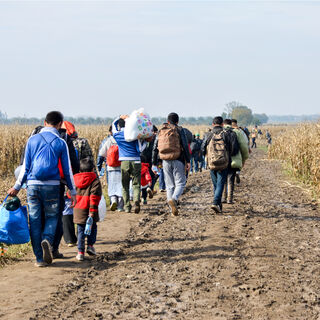Empathy
All Refugees Deserve Our Compassion
For many Western countries, Ukrainian refugees activate parochial empathy.
Posted April 6, 2022 Reviewed by Tyler Woods
Key points
- Ukrainian refugees are met with empathy across the world.
- Parochial empathy is empathy towards in-group members.
- Parochial empathy can have harmful consequences.
- All refugees need compassion, attention and help.

Some recent commentaries point out that it is racist to feel more empathy for Ukrainian refugees than for climate refugees needing our help right now. The Bulgarian president's statements that Ukrainian refugees "are not refugees we are used to...these are Europeans" reveals an unpleasant double standard.
There are many armed conflicts going on every single day with thousands of people dying and losing their homes in different parts of the world. Wars and conflicts in Afghanistan, Darfur, Iraq, Yemen, Congo, Nigeria, and Syria lead to tragic bloodshed, destroyed homes, families, and childhoods.
Countries respond differently to different types of refugees fleeing because of wars, armed conflict, or climate change. Geographical distance, shared culture, and history play a role—it is easier to relate to neighbors and those we know than to strangers. We respond with more emotion when we know the people who suffer. Spontaneous, discriminatory reactions are the natural limitations of our own empathy. But because they are often unconscious, we must recognize them, and make sure that they do not lead us to the dark path of bias.
Biased empathy
Empathy, feeling for others, is what moves humanity forward. Thanks to empathy, we put ourselves in someone else's experience and help each other. But empathy can also be our own worst enemy. So-called "parochial empathy," is aimed at only people who are perceived as part of our own group. Instead of being really oriented towards the other, parochial empathy is limited only to those who are like ourselves. Those who are not part of the in-group because of their background, skin color, language, culture, or resources are rejected to protect the in-group members.
When politicians or journalists describe Ukrainian refugees as "looking like us" and as "doing things like we do every day," they appeal to our parochial empathy. Writer and professor Moustafa Bayoumi described it as, "the racist coverage of Ukraine." Bayoumi pointed to examples of media coverage that describe European refugees as "civilized," which, in his interpretation, is like saying that refugees like Afghans and Iraqis are not, and therefore they are less worthy of our empathy.
Rational compassion
When I organized a fundraising activity for children refugees in March, I was asked if it is for Russian or Ukrainian children. I responded by quoting the Geneva Convention on the Protection of Civilians in Time of War: "The sick and wounded. They must be cared for, regardless of the side they’re on."
War brings out the worst and the best in people, and the paradox is that both have their roots in empathy. This is why Paul Bloom has been advocating for rational compassion when dealing with social injustices. Rational compassion is vital for survival in a global society with deep social and cultural inequalities.
References
This is an abridged version of an article originally published in Norwegian, Kucirkova, Natalia: 'Et hierarki av flyktninger?' ('A hierarchy of refugees'), Klassekampen, 10th of March: https://klassekampen.no/utgave/2022-03-10/debatt-et-hierarki-av-flyktni…
Bayoumi, Mustafa (2022), They are ‘civilised’ and ‘look like us’: the racist coverage of Ukraine, The Guardian, https://www.theguardian.com/commentisfree/2022/mar/02/civilised-europea…


